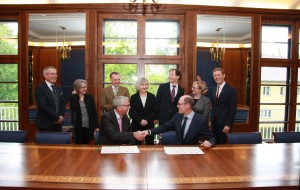
Front Row: Prof. Stephen Toope and Prof. Peter-André Alt. Back Row: Soren Harbel; Prof. Jutta Eming; Prof. Rainer Haag; Marie Gervais-Vidricaire, Canadian Ambassador to Germany; Prof. Klaus Hoffmann-Holland; Prof. Verena Blechinger-Talcott; Matthias Kuder.
On May 2, a new strategic cooperation agreement was signed between Freie Universität Berlin (FUB) and the University of British Columbia (UBC).
Building up on the successful cooperation between both universities in the past few years, the new agreement responds to the high level of interest on both sides among students and faculty.Future initiatives will focus on the development of collaborative teaching activities and joint study programs, the promotion of junior researchers, particularly on the doctoral and post-doctoral level, as well as joint research projects and the commercialization of technology.
“This new transatlantic alliance has the potential to become a German-Canadian flagship partnership,” said Prof. Dr. Peter-André Alt, the president of Freie Universität Berlin. “The teaming up of two highly dynamic world-class universities will open up new exciting opportunities to our students and researchers alike,” he added.
Freie Universität Berlin and the University of British Columbia share a strong international outlook in research and teaching. Their internationalization concepts include strategic partnerships with select universities and research institutions abroad. Freie Universität’s current network of strategic partnerships includes institutions in China, Russia and Israel, with new initiatives being developed with European partners. The strategic partnerships network of the University of British Columbia currently features Sciences Po, The University of Tokyo and Peking University, as well as the Max Planck Society and Freie Universität Berlin in Germany.
About FUB:
Freie Universität Berlin is one of eleven German Universities of Excellence. An internationally oriented university in the capital of Germany, it is particularly strong in the humanities and social sciences as well as in the life sciences, natural sciences, and medicine.